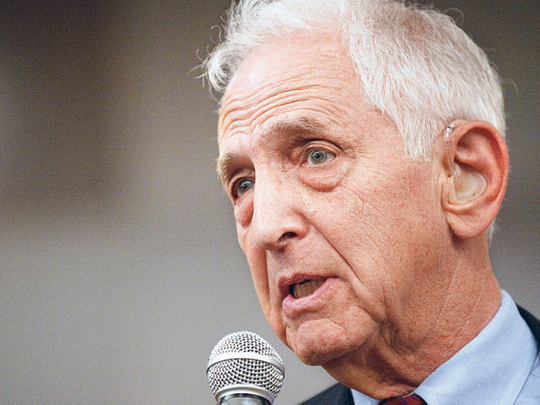
You live in a small town and the chances are you will have a chance encounter of enduring significance.
In the fall of 1974, I audited a course at MIT, in the small university town of Cambridge, Massachusetts. The course, dealing with the ethos of cities across cultures and eras around the world, was given by the celebrated sociologist and literary critic Lewis Mumford (d. 1990 at age 90), whose vision of the ideal urban environment, as he argued in his National Book Award work, The City in History, was embodied in the concept of the “organic city”, where ideally technological innovation did not subvert culture but evolved in accord with it.
Sitting next to me in the lecture hall, also as an auditor, was a tall, 43-year-old man with dark curly hair. I was there to put in my two-cents worth about how the traditional town or village in historic Palestine was built by its people in complete “homeostasis” — Professor Mumford’s term — implying harmonious equilibrium with its surroundings.
The tall man in the dark curly hair sitting next to me — copiously taking notes the whole while — was there, on the other hand, driven simply by intellectual inquisitiveness. He was that kind of guy, the kind who, as we say in our part of the world, would “seek knowledge though situated as far away as China”. Knowledge, that is, for the sake of knowledge.
The original whistle-blower
His name was Daniel Ellsberg. And three years earlier he had changed American history as the whistle-blower sans pareil, whose leak of the Pentagon Papers led him to be put on trial for espionage, where he faced a sentence of 115 years — only for the charges to be dropped later.
Today Ellsberg is a sprightly 90-year-old, an archangel of whistle-blowers everywhere, the impact of whose one-two punch to a duplicitous establishment, engaged in a conspiracy of silence about America’s machinations in Vietnam, continues to this day to reverberate around every corner of American political culture, a hawk-turned-dove activist whom then National Security Advisor Henry Kissinger had told his staff was “the most dangerous man in America who must be stopped at all costs”.
It was exactly 50 years ago this week, on June 13, 1971, when the Pentagon Papers began serialising in the New York Times and later in the Washington Post, the Boston Globe and other national dailies. And America was never the same again.
The saga began when President Johnson’s Secretary of Defence Robert S. McNamara had commissioned a study of the history of American relations with Vietnam between 1945 and 1967.
He assembled a motley crew of academics to work on the project, including Leslie Gelb, a Harvard PhD (and later president of the prestigious Council on Foreign Relations) as editor-in-chief. Gelb in turn persuaded Ellsberg, along with other up-and-coming PhDs, to write chapters in the 47-volume study.
The Pentagon Papers
The Pentagon Papers, classified as “Top Secret”, showed that the US, throughout the tenure of five consecutive presidents — Harry Truman, Dwight Eisenhower, John Kennedy, Lyndon Johnson and Richard Nixon — had told Americans, along with the rest of the world, a whole bunch of what turned out to be, well, outright whoppers about America’s relations with Vietnam.
The week, fifty years ago, when the Pentagon Papers were being revealed to the American people, the press was seen as the knight in shining armour that rescued their right to know — a right then under stress — from being violated. Time Magazine’s cover, for example, showed a folded copy of the New York Times with the headline, “Pentagon Papers: The Secret War”.
If you were around in those days, you would’ve felt the power of that mastering grip that those revelations had, not only on the repertoire of America’s political culture but on that of people globally — for unlike proverbial Vegas, where what happens there stays there, what happens in Washington, in time and in a trickle-down effect, happens around the world.
Yet, though the hero in all this may have been the journalistic enterprise, which had ardently sought and valiantly fought to publish the Pentagon Papers — going all the way to the Supreme Court to plead its case — but the superhero was Daniel Ellsberg, a man who had felt morally compelled, even at the risk of spending the rest of his life behind bars, to do the right thing.
In 2009, at the premier of the award-winning, Oscar-nominated documentary, “The Most Dangerous Man in America: Daniel Ellsberg and the Pentagon Papers", Ellsberg, the eminence grise of 1960s activism, whose interest in human affairs and the life of the mind extended to acquainting himself with the role that the city played in history, now sporting a mop of grey hair, reminisced about a war that left a lasting scar on the soul of America’s body politic.
But, above all, he reminisced about those fellow-activists — idealists one and all — who marched in the streets to protest their government’s costly, not to mention perplexing pursuit of armed “peasants in black pyjamas” in the jungles of Vietnam.
“We were young, we were foolish, we were arrogant”, he said, “but we were right”.
Yes we were. Very much so.
— Fawaz Turki is a journalist, academic and author based in Washington. He is the author of The Disinherited: Journal of a Palestinian Exile








